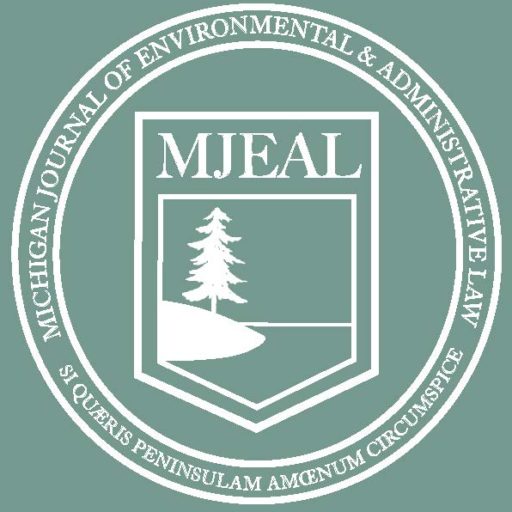Executive Order 14154 and the Uncertain Future of NEPA Ben Foster Introduction Since it was signed into law on New Year’s Day 1970, the National Environmental Policy Act (NEPA) has been a key tool leveraged by the federal government, the states, and environmental advocates to hold agencies and private actors accountable for the potential environmental… Continue reading Foster – Winter 2025
Month: April 2025
Whelan – Winter 2025
Shaping Industrial Geography: The Environmentalist Third Rail Michael Whelan Transportation shapes not only the housing and commuting patterns of people, but also the production and storage patterns of industries. In the early 20th century, railroads encouraged concentration of industry. This concentration changed with the transition to a trucking economy, which fostered industrial sprawl.[1] Yet contrary… Continue reading Whelan – Winter 2025
Meng – Winter 2025
Citizen Suits in China: How a U.S. Legal Tool Functions in Chinese Environmental Law Finley F.R. Meng* Introduction China’s environmental pollution and ecological destruction have become major concerns since it chose the “Open Door” policy[1] in 1978 and rapidly developed into a major industrialized country. Over the past twelve years of President Xi Jinping’s rule,… Continue reading Meng – Winter 2025
Nguyen – Winter 2025
Trusting Courts to Protect the Environment: The Aftermath of Loper Bright. Anna Nguyen “Chevron is overruled.”[1] On June 28th, 2024, the Supreme Court dismantled a 40-year-old precedent that deferred courts to the reasonable interpretation of agencies.[2] Chevron U.S.A., Inc. v. Natural Resources Defense Council was a landmark case.[3] The Supreme Court recognized the specialized expertise… Continue reading Nguyen – Winter 2025
Tahara – Winter 2025
Trump’s Manufactured National Energy Emergency: the Legal Basis and Cause for Alarm Kevin Tahara Since taking office in 2025, President Trump has issued a total of sixty-eight executive orders as of late February on a wide range of topics, such as immigration, healthcare, and foreign affairs.[1] One of these recent orders titled “Declaring A National… Continue reading Tahara – Winter 2025
Hill – Winter 2025
What’s Next for Line 5? James Hill Line 5 is an oil and liquefied natural gas (LNG) pipeline operated by Canadian energy company Enbridge; a key segment was built on the lakebed between the southern and upper peninsulas of Michigan in the straits of Mackinac in 1953.[1] The pipeline was meant to last for only… Continue reading Hill – Winter 2025
Carson – Winter 2025
America’s Nuclear Comeback: Pros, Cons, and Prescriptions Stuart Carson In March 2011, a tsunami overwhelmed the Fukushima Daiichi Nuclear Plant’s seawall, flooding its facilities and cutting electrical power.[1] Without power for cooling, the fuel rods in reactors 1,2, and 3 overheated and melted down, releasing radiation.[2] Nuclear regulators eventually elevated the severity level of the… Continue reading Carson – Winter 2025
Knoop – Winter 2025
Non-Lawyers as a Means of Increasing Access to Justice in Administrative Proceedings Edie Knoop Just months into the Trump Administration, the federal administrative state is facing mass layoffs and widespread uncertainty about the future for many federal employees. As part of his government overhaul, President Trump has ordered the firing of probationary employers, numbering… Continue reading Knoop – Winter 2025
Barpal – Winter 2025
The Short-Sightedness of State Bans on Cultivated Meat Jordan Barpal In May of 2024, Florida and Alabama became the first states in the U.S. to ban the manufacture, sale, and distribution of cell-cultured (i.e. “lab grown” or “cultivated”) meat.[1] Lab grown meat takes cells from animals and cultivates them in a lab, simulating the feeding… Continue reading Barpal – Winter 2025
Swetnam-Burland – Winter 2025
Gone Before Its Time: The Untimely Demise of Environmental Title VI Challenges Clara Swetnam-Burland In Flint, Michigan, a city already plagued by a pervasive clean water crisis,[1] many of the city’s Black and low-income residents face another equally dangerous threat to their health.[2] In 2021, the Michigan Department of Environment, Great Lakes, and Energy (EGLE)… Continue reading Swetnam-Burland – Winter 2025
